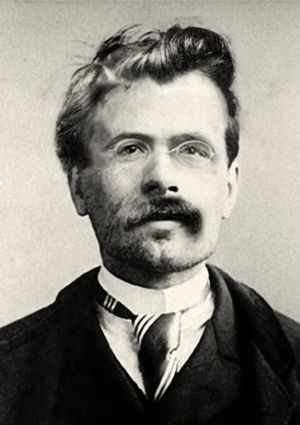One of our staff members is contributing considerably to a News Archiving service at Mu. Any well educated (Masters, PhD or above) users who wish to make comments on news sites, please contact Jim Burton directly rather than using this list, and we can work on maximising view count.
Friedrich Nietzsche: Difference between revisions
` |
No edit summary |
||
| (4 intermediate revisions by 3 users not shown) | |||
| Line 1: | Line 1: | ||
'''Friedrich Nietzsche''' was a German philosopher of the nineteenth century, known for his challenges to conventional morality and religion. Nietzsche was sympathetic towards pederasty: | [[File:Friedrich Nietzsche.jpg|thumb|Nietzsche]]'''Friedrich Nietzsche''' was a German philosopher of the nineteenth century, known for his challenges to conventional morality and religion. Nietzsche was sympathetic towards [[pederasty]]: | ||
<blockquote>''The erotic relationship of men to youths was, on a level which we cannot grasp, the necessary, sole prerequisite of all male education (more or less in the way love affairs and marriage were for a long time the only way to bring about the higher education of women); the whole idealism of strength of the Greek character was thrown into that relationship, and the treatment of young people has probably never again been so aware, loving, so thoroughly geared to their excellence (virtus), as it was in the sixth and fifth centuries-‑-in accordance with Hölderlin's beautiful line, "denn liebend giebt der Sterbliche vom Besten" (for loving the mortal gives of his best).''<ref>''[http://nietzsche.holtof.com/Nietzsche_human_all_too_human/sect5_signs_of_higher_and_lower_culture.htm Human, All Too Human]''</ref></blockquote> | |||
There is some evidence<ref>[http://www.f-nietzsche.de/ortlepp_vortrag_e.htm F.Nietzche.de bio]</ref> to suggest that Nietzsche was romantically mentored by the poet Ernst Ortlepp during his childhood and adolescence. | |||
==See also== | |||
<div style="column-count:2;-moz-column-count:2;-webkit-column-count:2"> | |||
*[[Johann Wolfgang von Goethe]] | |||
*[[Michel Foucault]] | |||
*[[Judith Butler]] | |||
*[[Novalis]] | |||
*[[Thomas Mann]] | |||
</div> | |||
==References== | |||
[[Category:Official Encyclopedia]] | [[Category:Official Encyclopedia]] | ||
Latest revision as of 02:15, 7 January 2025

Friedrich Nietzsche was a German philosopher of the nineteenth century, known for his challenges to conventional morality and religion. Nietzsche was sympathetic towards pederasty:
The erotic relationship of men to youths was, on a level which we cannot grasp, the necessary, sole prerequisite of all male education (more or less in the way love affairs and marriage were for a long time the only way to bring about the higher education of women); the whole idealism of strength of the Greek character was thrown into that relationship, and the treatment of young people has probably never again been so aware, loving, so thoroughly geared to their excellence (virtus), as it was in the sixth and fifth centuries-‑-in accordance with Hölderlin's beautiful line, "denn liebend giebt der Sterbliche vom Besten" (for loving the mortal gives of his best).[1]
There is some evidence[2] to suggest that Nietzsche was romantically mentored by the poet Ernst Ortlepp during his childhood and adolescence.